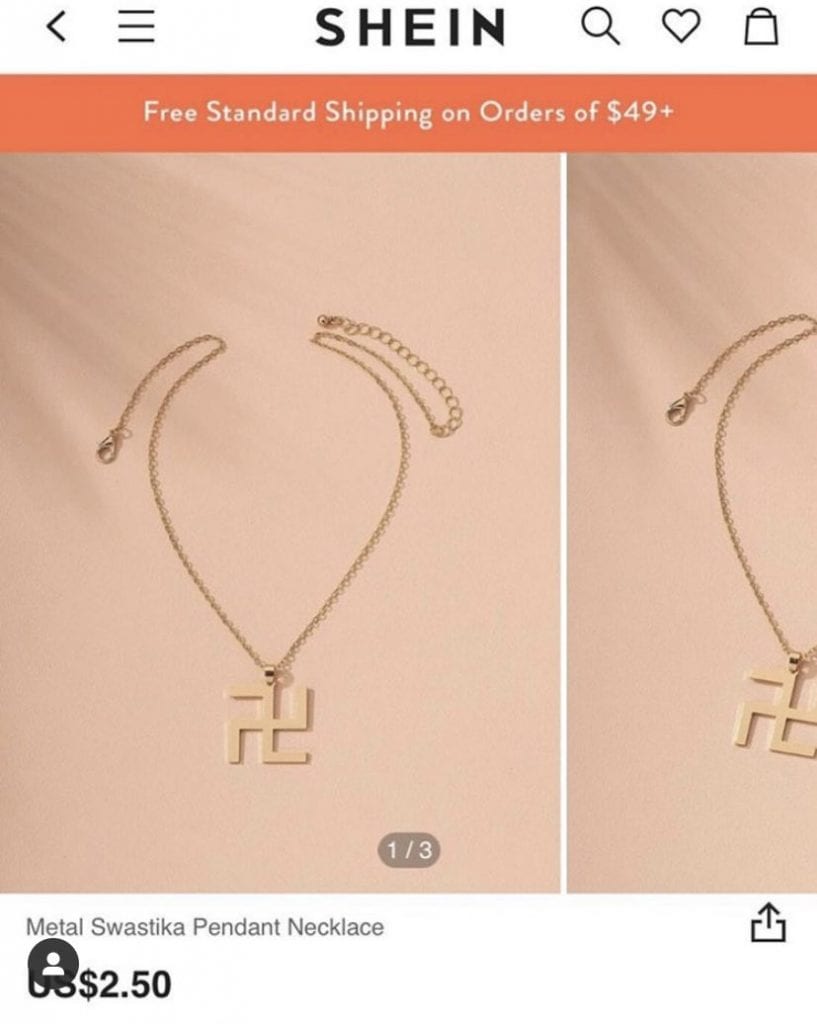Shein, an online retailer with the philosophy that “everyone can enjoy the beauty of fashion,” made headlines this week when consumers uncovered a $2 necklace resembling a swastika on its site. While the scandal raises interesting issues, including about the level of oversight exercised by the 12-year old company in connection with the dozens of low-cost garments and accessories it introduces to consumers each day, it also serves to provide a peek into the rapid rise and potential shortcomings of the burgeoning fashion retailer as it continues to attract fans across the globe thanks to its dirt-cheap products and sweeping social media marketing.
Its second controversy in just as many weeks, Shein came under fire recently, according to CBS, for selling rugs that bore a striking “resemblance to Muslim prayer mats, with some featuring illustrations of the Kaaba, one of Islam’s most sacred mosques.” Just as in the case of the rugs, the Nanjing, China-headquartered company apologized to its followers for the necklace in a social media post, and attempted to calm the internet furor by pulling the product from its site. The company went further, asserting that the necklace does not actually feature a Nazi swastika pendant, but instead, makes use of “a Buddhist swastika, which has symbolized spirituality and good fortune for more than a thousand years.”
The recent attention that the company has received for its product offerings puts the largely press-shy Shein in the spotlight. Despite its growing digital footprint, the workings of the digitally-native fast fashion company – which got its start in 2008 under the watch of under-the-radar businessman Chris Xu – have been largely under wraps. One of the main exceptions to its relatively low-key profile came in 2018 when it was revealed that Shein’s system had been breached by hackers, thereby, exposing the emails and encrypted passwords of some 6.42 million customers. At the time, security experts slammed Shein for “relying heavily on reactive” – as opposed to proactive – “cybersecurity strategies that detect and control breaches in progress or after the fact, and often not fast enough” to adequately protect consumer information.
Since then, the company has carried on, and behind its seemingly guarded corporate existence, it has been building a burgeoning empire. As Shein’s garments have come to saturate Amazon’s e-commerce marketplace, and as it has garnered buyers of cheap tops, dresses, and swimwear in as many as 230 countries thanks to its targeted – but largely generic – social media marketing campaigns, the company has reportedly breezed past the billion dollar revenue mark. According to SCMP’s Chinese news site Abacus, the company’s sales amounted to $2.83 billion in 2019.

To put its appeal (and its reach) in a nutshell: the company “tripled its business in [India] in under a year” as of 2018, amassing over 1 million daily active users and handling over 10,000 orders daily. As of September 2018, it was revealed that in just a year’s time, Shein saw its country-specific app downloaded more than 5 million times. That all occurred before the company was banned by the Indian government in order to “avoid any privacy invasions and to secure the Indian cyberspace.”
Raking in multi-billion revenues, Shein is part of a group of “several strong Chinese brands [in the] intensely and increasingly competitive world of [fast] fashion [that are] challenging more established players for a share of the global online market,” per BrandZ and Google’s 2019 top 50 Chinese global brand builders list, on which Shein nabbed the number 14 spot. Shein stands out, according to Jackson Ng, the Global Client Strategy Director for Hill + Knowlton Strategies, “because it has a value proposition and is strengthening their presence on key mainstream platforms.”
Yet, despite its robust business, Shein’s name has not garnered the same level of consumer recognition as fellow digitally-native fast fashion entities like Fashion Nova or Missguided, and instead, has been grouped in with other low-cost, low-quality Chinese companies like Romwe, DressLily, ModLily, and Zaful, among others. This is likely due to the fact that its model, for the majority of its 12-year-long lifespan, has seen Shein operate more as a retailer of clothing than as a glossy fashion or lifestyle brand. To a certain extent, however, that is – or maybe, was – beginning to change.
As of late, Shein appears to have embarked on a public relations push to mainstream its name and legitimize its offerings (not unlike what Fashion Nova did when it bolstered in influencer roster, tapping the likes of the Kardashian/Jenners and co. to promote its designer copycat wares, and began to proclaim that it was looking to “slowly dissolve the perceived separation between ‘high-end’ and ‘cheap’ clothes and make trendy fashion accessible to everyone.”). As a result, Shein has been increasingly name-checked in paid-for posts by celebrities – such as Riverdale actress Madelaine Petsch, and fashion industry influencers like Chriselle Lim – on Instagram, where the brand boasts a following of more than 11 million.
More recently, it wrangled even bigger stars, like Katy Perry, Lil Nas X, Hailey Bieber, Rita Ora, and Yara Shahidi, into its camp, enlisting them to participate in its May 2020 #SheinTogether event (and the related marketing), an online fundraiser to benefit the World Health Organization’s COVID-19 Solidarity Response Fund that drew over 1.6 million viewers, according to the brand.
The recent pushback that the brand has received in connection with its offerings are likely to set it back amid its larger publicity-push, as consumers are enraged. While some Twitter users have come to the company’s defense, pointing to the long-standing significance of the symbol for Buddhists and Hindus, the majority are calling on their followers to boycott the brand, and to “educate [themselves] about the companies you buy from.” Just “in case you needed another reason to boycott Shein,” wrote one Twitter user, pointing to an image of the swatiska necklace on Shein’s e-commerce site. “As if their labor practices aren’t problematic enough,” another quipped.
As for the company, it has asserted in a statement that it is “actively working through our internal structure and processes to resolve these issues, including a product review committee to ensure that we respect our diverse community. We are a global and all-inclusive brand and we are taking extreme measures to ensure that all items are cleared through a rigorous vetting process before we retail them.”














